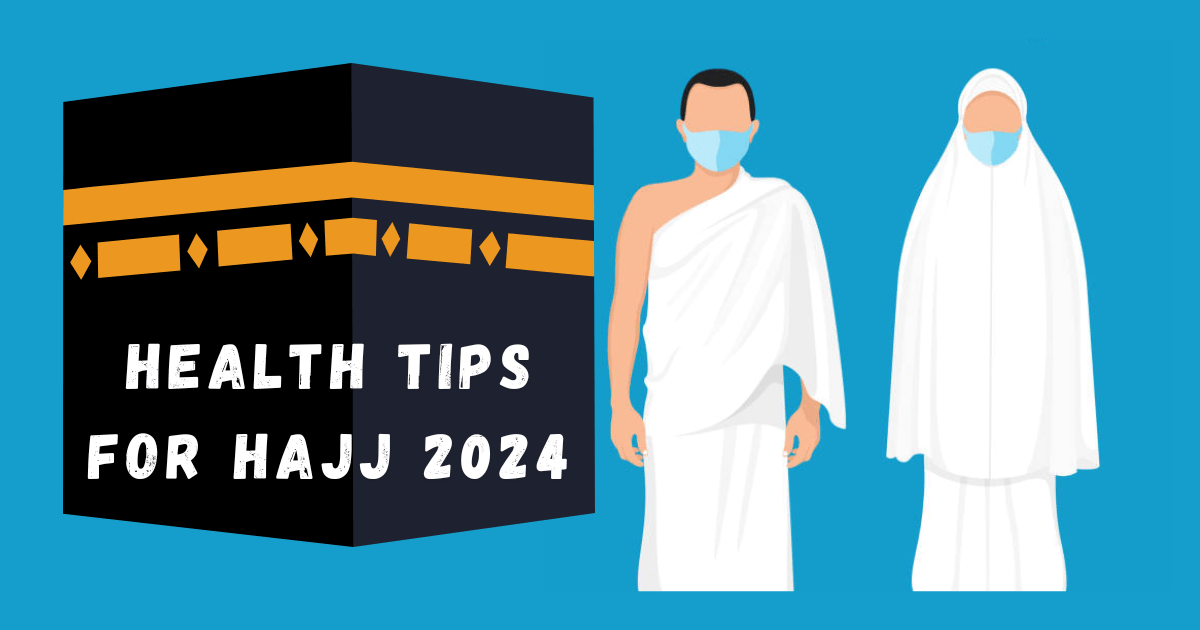
Health Tips for Hajj 2024, embarking on the spiritual journey of Hajj is a momentous occasion for Muslims around the world. As you prepare for this sacred pilgrimage, it’s crucial to prioritize your health and well-being. Here are some essential tips to ensure a safe and fulfilling Hajj experience.
Health Tips for Hajj No-1
Stay Hydrated Throughout Your Journey
One of the most critical aspects of preparing for Hajj is hydration. The desert climate of Saudi Arabia can be extremely hot, leading to dehydration and heat exhaustion. Pilgrims should aim to drink plenty of water throughout the day, especially during outdoor activities. Carrying a refillable water bottle and drinking fluids rich in electrolytes can help maintain hydration levels.
Hydration is key, especially in the sweltering heat of Mecca. Carry a refillable water bottle and drink plenty of fluids to prevent dehydration. Opt for water over sugary drinks to stay energized and refreshed.
Health Tips for Hajj No-2
Dress Appropriately for the Climate
The attire worn during Hajj should be both modest and comfortable. For men, the Ihram consists of two white seamless garments, while women typically wear loose-fitting clothing that covers their bodies. It’s essential to choose fabrics that are breathable and lightweight to stay cool in the desert heat. Additionally, wearing a wide-brimmed hat and sunglasses can provide protection from the sun’s harsh rays.
Shield yourself from the intense sun by packing essentials like sunscreen, sunglasses, and a wide-brimmed hat. Protecting your skin from harmful UV rays will prevent sunburns and heat exhaustion, allowing you to focus on the spiritual significance of Hajj.
Health Tips for Hajj No-3
Practice Good Hygiene and Sanitation
Respiratory infections, such as the flu and COVID-19, can spread rapidly in crowded settings like Hajj. Pilgrims should practice good respiratory hygiene by covering their mouths and noses with a tissue or their elbow when coughing or sneezing. It’s also advisable to avoid close contact with individuals who exhibit symptoms of respiratory illness.
Maintaining personal hygiene is crucial during Hajj to prevent the spread of illnesses. Pilgrims should pack essential items such as hand sanitizer, disinfectant wipes, soap, toilet paper, and oral hygiene products. These items will be invaluable, especially in crowded areas where access to clean facilities may be limited.
Maintaining proper hygiene is paramount during Hajj, where large crowds gather in close quarters. Wash your hands frequently with soap and water, especially before meals and after using the restroom. Carry hand sanitizer for moments when washing facilities are not readily available.
Health Tips for Hajj No-4
Prioritize Comfortable Footwear
Comfortable footwear is a must-have for the extensive walking involved in Hajj rituals. Invest in sturdy, comfortable shoes that provide ample support and cushioning. Avoid blisters and foot pain by breaking in your footwear before the pilgrimage.
Health Tips for Hajj No-5
Eat Nutritious and Balanced Meals
Fuel your body with nutritious meals that provide sustained energy throughout the day. Opt for whole foods like fruits, vegetables, lean proteins, and whole grains. Avoid heavy and oily foods that may cause discomfort or digestive issues.
Health Tips for Hajj No-6
Get Sufficient Rest and Sleep
Amidst the excitement of Hajj, it’s essential to prioritize rest and sleep for your overall well-being. Aim for at least 7-8 hours of sleep each night to recharge your body and mind. Listen to your body’s cues and take short breaks when needed during the pilgrimage.
Health Tips for Hajj No-7
Stay Mindful of Crowd Safety
Hajj involves significant physical exertion, including long walks, standing for extended periods, and performing rituals such as Tawaf and Sa’i. Pilgrims should engage in regular exercise leading up to the journey to build endurance and strength. Activities such as walking, jogging, and light weight training can improve cardiovascular health and prepare the body for the demands of Hajj.
Navigate the crowded spaces of Hajj with caution and mindfulness. Stay close to your group or companions, and establish meeting points in case you get separated. Be aware of your surroundings and follow instructions from authorities to ensure your safety.
Health Tips for Hajj No-8
Manage Stress Through Rest and Pace Yourself
While the desire to complete all the rituals of Hajj promptly is understandable, it’s essential to listen to your body and pace yourself. Taking regular breaks to rest and recharge can prevent fatigue and overexertion. Adequate rest is crucial for maintaining physical and mental well-being throughout the pilgrimage.
Hajj can be an emotionally and physically demanding journey, so it’s essential to manage stress effectively. Take moments for meditation, prayer, and self-reflection to find inner peace amidst the hustle and bustle. Practice deep breathing exercises to calm your mind and body.
Health Tips for Hajj No-9
Stay Connected With Loved Ones
Maintain communication with your loved ones back home to provide reassurance and stay connected during your pilgrimage. Share your experiences and updates regularly to alleviate any concerns and strengthen familial bonds.
Health Tips for Hajj No-10
Seek Medical Assistance When Necessary
Upon returning from Hajj, pilgrims should monitor their health closely for any signs of illness or discomfort. It’s not uncommon to experience post-Hajj fatigue or respiratory symptoms due to exposure to crowded environments. If any health concerns arise, seeking medical attention promptly is advised.
If you experience any health concerns or discomfort during Hajj, don’t hesitate to seek medical assistance. Medical facilities and services are available to pilgrims, ensuring prompt attention and care when needed. Carry essential medications and first-aid supplies for minor ailments.
In conclusion, prioritizing your health and well-being is essential for a safe and fulfilling Hajj experience. By following these health tips, you can navigate the pilgrimage with confidence, focusing on the spiritual significance of this sacred journey. May your Hajj be blessed with peace, health, and spiritual enlightenment.
FAQs Regarding Health Tips for Hajj
What vaccinations are required for Hajj?
Vaccinations for diseases such as meningitis, influenza, and polio are typically required for entry into Saudi Arabia for Hajj. Additionally, it’s advisable to ensure routine vaccinations are up-to-date before embarking on the pilgrimage.
How can I prevent heat-related illnesses during Hajj?
To prevent heat-related illnesses during Hajj, stay hydrated by drinking plenty of water throughout the day. Wear loose, lightweight clothing that covers your skin, and use sunscreen with a high SPF. Take breaks in shaded areas and avoid prolonged exposure to direct sunlight.
What should I include in my Hajj first aid kit?
Your Hajj first aid kit should include essentials such as bandages, antiseptic wipes, adhesive tape, pain relievers, antihistamines, and any personal medications you may require. It’s also helpful to include items like hand sanitizer, sunscreen, and oral rehydration salts.
Is it safe to consume food from street vendors during Hajj?
While street food vendors may offer tempting snacks and meals during Hajj, it’s essential to exercise caution. Choose vendors who follow hygienic practices and serve freshly prepared food. Avoid eating raw or undercooked foods, and prioritize hot, well-cooked meals from reputable establishments.
How long should I rest after completing the Hajj pilgrimage?
The duration of rest needed after completing the Hajj pilgrimage can vary for each individual. Listen to your body and give yourself adequate time to rest and recover from the physical and emotional demands of the journey. It’s advisable to rest for at least a few days to a week before resuming regular activities.
Follow these Health Tips for Hajj 2024!



